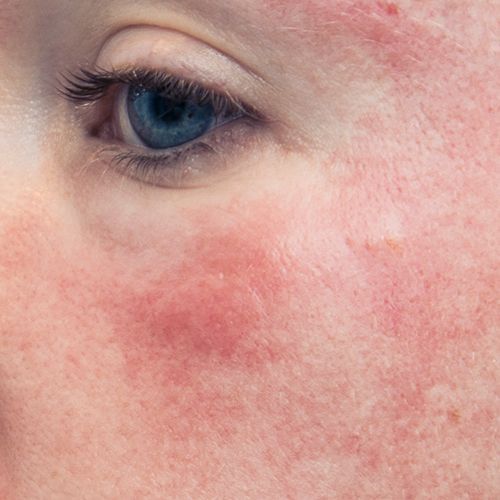Posted by Barbosa, Larissa on 26th Apr 2024
Sensitive skin: learn about its characteristics and care
Many people suffer from very sensitive skin, and if you're going through this or have been through it, you know how difficult it is to find suitable products for sensitive skin. This type of skin needs more attention and specific care to avoid major problems and keep it healthy at all times.
In this blog, we're going to better understand why our skin becomes sensitive, what conditions make it so and give you practical tips for creating a skin care routine and how to treat it properly!
Causes and symptoms of sensitive skin
For these reasons, it is necessary to understand the causes of this sensitivity in order to help deal with the problem in a better way.
In general, this type of skin can be the result of a number of factors, such as:
- Genetics
- Allergy
- Reaction to products
- Hormonal changes
Among these symptoms, the most common we see in sensitive skin are redness, itching, flaking and burning.

Sensitive skin: is it a skin type or a condition?
Many people think that sensitive skin is just a condition that, with the right treatment, will soon go away. However, according to dermatological studies, skin sensitivity occurs mainly due to the loss of the integrity of the tissue barrier. When this layer is broken down, excessive penetration of microorganisms can occur, unbalancing the microbiome of the face or body.
In this way, we can understand that this sensitivity is a condition and can happen to any skin. Some people naturally have more sensitive skin, while others can develop hypersensitivity due to external factors.
Characteristics of sensitive skin
We need to understand that sensitive skin has distinct characteristics and the main one is that it is prone to adverse reactions. When this occurs, it can look thinner and more delicate, becoming irritated easily, with red patches (sometimes scaly and itchy), and in more serious cases it can even develop wounds.
5 main diagnoses for sensitive skin
Before we talk about the main diagnoses for this type of skin, it's worth pointing out that this is informative content and if you have any doubts about your skin, go to a dermatologist you trust for an assessment.
1. Skin with atopic reactions
It is a skin type characterized by an exaggerated inflammatory response. People with this condition may have a genetic predisposition to dermatitis and other dermatological pathologies. This type of skin needs extra care, avoiding products that irritate the skin and those with strong ingredients, as well as always keeping it moisturized to increase the protective barrier.
2. Skin with fragile protective barrier
Naturally sensitive skin can occur due to genetic factors or a natural weakening of the protective barrier. If this is the case, we recommend avoiding products with aggressive and highly concentrated ingredients, as they can cause irritation.
Another point to be aware of is that in winter we need to take special care and also in warmer seasons, as extreme temperatures are a degrading factor for cell tissue.
3. Reactive skin to external aggressions and chemicals
Reactive skin is a condition in which exaggerated reactions occur due to the use of products that are unsuitable for this condition.
In cases like this, redness, itching, burning and in some cases rashes can occur. It is extremely important to identify these ingredients that cause these reactions with the help of a specialist
4. Thin, delicate skin
This skin is one of the conditions most susceptible to developing skin hypersensitivity. It ends up suffering from damage and irritation due to natural ageing or genetic factors. In these cases, we recommend taking excessive care to protect it, especially from sun damage.
Always have sunscreen on hand, preferably one for the body and one for the face, use nourishing moisturizers frequently and avoid using aggressive products. Using specific make-up for this skin is also a good option.
5. Sensitive skin during pregnancy
During pregnancy, many women experience hormonal changes that often result in skin symptoms such as sensitivity. If this is the case for you, the best thing to do is to adjust your skincare routine during pregnancy, so you can ensure that you're using products that are suitable for pregnant women and that are appropriate for your skin at the time.
How to treat sensitive skin?
Now that we've understood all the aspects that can make your skin sensitive, let's move on to the most important point of this article! Treating sensitive skin will require you to be very careful and disciplined and to help you with this process, we've put together some tips for you to include in your skincare routine and get great results:

1. keep your skin clean: use a soft wipe or cleanser at least twice a day to remove impurities. Avoid scrubbing or using exfoliants that can cause irritation.

2. Moisturize regularly: your skin needs constant hydration to stay healthy and protected. Opt for gentle moisturizers that are suitable for your skin

3. Avoid harsh products: check product labels and avoid ingredients that can cause irritation to your skin, hypoallergenic products are a great option.

4. Protect yourself from the sun: use sunscreen regularly so that your skin is always protected from the damage caused by UV rays. The higher the SPF, the longer the protection time

5. Test the product before use: before buying a new product, check as much information as possible and if you can, test the product on a small area of your face to see if there will be any reaction.
Having sensitive skin requires a lot of care, but with the right information, you can keep your skin healthy and radiant. Remember that if you notice any unusual symptoms, the best thing to do is always to go to a specialized doctor.

